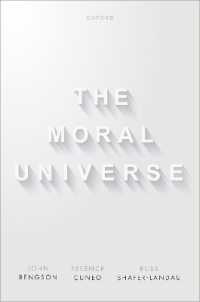- ホーム
- > 洋書
- > 英文書
- > Politics / International Relations
Full Description
Do negative campaigns win elections? Do voters abandon candidates accused of scandalous behaviour? Do government apologies affect prospects for re-election? While many people assume the answer to each of these questions is yes, there is limited empirical evidence to support these assumptions. In this book, Jason Roy and Christopher Alcantara use a series of experiments to test these and other commonly held beliefs.
Each chapter draws upon contemporary events and literature to frame the issues and strategies. The findings suggest that not all of the assumptions that people have about the best strategies for winning and keeping political power hold up to empirical scrutiny. In fact, some work in ways that many readers may find surprising.
Original and innovative in its use of experimental methods, Winning and Keeping Power in Canadian Politics is a persuasive analysis of some of our most prominent and long-standing political myths. It will be a "go to" resource for journalists, strategists, scholars, and general readers alike.
Contents
List of Figures
List of Tables
List of Appendices
Preface
Acknowledgments
1. An Overview of Winning and Keeping Power in Canadian Politics
Part One: Winning Power - Election Campaigns
2. Going Negative in Canadian Federal Elections
3. Political Scandals
4. Candidate Endorsements
5. The Quality of Local Candidates
Part Two: Keeping Power - Public Opinion and Incumbency
6. Parliamentary Configurations and Assigning Political Responsibility
7. Election Timing
8. The Supreme Court of Canada, Parliament, and the Role of Experts
9. Framing Public Budgeting
10. Political Apologies
11. Reflections, Recommendations, and Future Research





